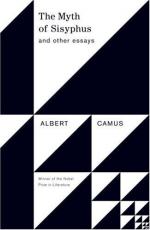
|
| Name: _________________________ | Period: ___________________ |
This test consists of 15 multiple choice questions and 5 short answer questions.
Multiple Choice Questions
1. What embodies 'a drama of the intelligence', according to Camus?
(a) The great scientific discoveries.
(b) The plays of Shakespeare.
(c) A marvel of engineering.
(d) A work of art.
2. What is ridiculous about the writer who emulated Peregrinos?
(a) The writer suicided in despair and his relatives benefited hugely from the royalties.
(b) He tried to commit suicide by drowning in the Seine, but could not sink.
(c) The writer suicided so his book would be noticed, but the book was no good.
(d) He thought the name would make him a great travel writer, but he failed.
3. Why did the gods view Sisyphus' punishment as particularly dreadful?
(a) It involved immense pain.
(b) They saw their mistake but were unable to change things.
(c) It was unfair relative to his crime.
(d) It involved futile and hopeless labor.
4. What is a characteristic of wisdom?
(a) Living on what one has, not speculating about what one does not have.
(b) Living with faith and integrity and reserving judgement.
(c) Being able to supply a rationale for any action.
(d) Knowing when to take things on trust, as well as when not to.
5. Which art and science have close affinity?
(a) Music and mathematics.
(b) Music and kinesthetics.
(c) Painting and geometry.
(d) Fiction and physics.
6. How does Kafka express the absurd?
(a) Through the logical.
(b) Through representations of everyday life.
(c) Through farce that is close to sentimentality.
(d) Through tragedy.
7. What assertions are always false?
(a) That everything is invisible and nothing is true.
(b) That everything is true and that everything is false.
(c) That being is false and nothingness is inevitable.
(d) That humans are wise and invincible.
8. What has Camus to say about 'great revolutions'?
(a) They are always metatextual.
(b) They never last.
(c) They take us into a sure future.
(d) They are always metaphysical.
9. What binds a man to the absurd?
(a) His intelligence.
(b) His consciousness of it.
(c) His sentient nature regarding death.
(d) Philosophy.
10. What would be a synonym for the phrase 'fecund rumination' (p. 93 of the Penguin Edition)?
(a) Lively imagination.
(b) Vetinarary fees.
(c) Productive thought.
(d) Happy return.
11. How is Oedipus' fate announced?
(a) By means of a letter device.
(b) Superbly.
(c) As a result of gossip.
(d) Supernaturally.
12. To which school of thought does Husserl belong?
(a) Phenomenology.
(b) Teleology.
(c) Rationalism.
(d) Geomorphology.
13. What 'two worlds' does Kafka present in his novels?
(a) The absurd and the prosaic.
(b) Anxiety and the absurd.
(c) Everyday life and supernatural anxiety.
(d) Everyday life and transcendent ecstasy.
14. What comment does Camus make concerning suffering?
(a) It should be avoided.
(b) It is useless.
(c) It is ennobling.
(d) It must be endured.
15. When did Sisyphus test his wife's love?
(a) When he was close to death.
(b) As he was leaving on his travels.
(c) When he returned from his travels.
(d) On their wedding night.
Short Answer Questions
1. What was Sisyphus' attitude to the gods?
2. What has Camus to say about Kirilov's reasoning?
3. Identify the literary device Camus uses in: 'Even men without a gospel have their Mount of Olives'.
4. Why does Chestov think we turn to God?
5. In The Castle, what is significant about the character Amalia?
|
This section contains 607 words (approx. 3 pages at 300 words per page) |

|




